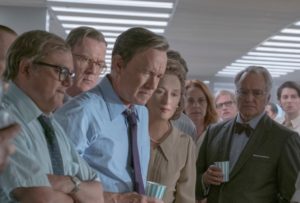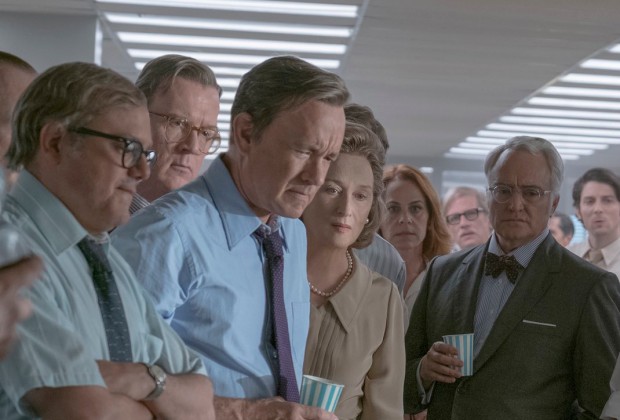The Post
Posted on December 25, 2017 at 11:01 pm
A-| Lowest Recommended Age: | Middle School |
| MPAA Rating: | Rated PG-13 for language and brief war violence |
| Profanity: | Some strong language |
| Alcohol/ Drugs: | Smoking and drinking |
| Violence/ Scariness: | Some wartime violence |
| Diversity Issues: | Some sexist treatment |
| Date Released to Theaters: | December 25, 2017 |
| Date Released to DVD: | April 16, 2018 |

Katherine Graham (Meryl Streep), publisher of The Washington Post, is going over a list of financial and legal documents once again, rehearsing her answers to the questions she will be getting from bankers about selling shares in the company to the public for the first time. This job is one she never anticipated and never wanted. Her father had handed the business over to her husband and she had been perfectly content to be a mother and a socialite, hosting gracious parties and enjoying friendships with people who were important but never being important herself. But her husband has died — no, she reminds a colleague, he committed suicide. And so this is the job she has, even though the men around her are not sure she can do it and she is far from sure herself.
Daniel Ellsberg (“The Americans'” Matthew Rhys), a top aide to Defense Secretary Robert McNamara (Bruce Greenwood), watches his boss tell reporters that the military was making progress in Vietnam, exactly the opposite of what Ellsberg had told him moments before. Later, working for the RAND Corporation think tank, he would take 47 volumes of reports on the government’s lies about the military efforts in Vietnam and send them to the New York Times. When the Nixon administration got a court order to stop further publication, it was shy, inexperienced Mrs. Graham who would have to decide whether she would risk her reputation, her family business, and even her freedom to continue to print the story.
And that, my friends in journalism, is why The Post, about the real-life publication of the Pentagon Papers, is not about the New York Times, which published them first, but about the then-considerably second-tier Washington Post and Mrs. Graham, who risked the collapse of the crucial deal to secure their finances, published second. This is about a woman who did not have greatness thrust upon her; she became great when greatness beckoned. And in playing Graham, we see a woman who began great and is still getting greater.
I know, I know, we’re all kind of over how great Meryl Streep is. She has given us so many decades of impeccable performances and inevitable awards nominations that we just take her for granted. But Streep’s performance in “The Post” is worthy of special attention because it shows us exactly what makes her the best actor of her generation. There’s nothing especially flashy about it. She did not have to learn a new language or transform herself as she has done in the past. Yet she is, as always, astonishingly precise in this film as Katharine Graham, a very private 1970’s socialite who is not yet aware of how fundamentally she is changing to become the leader of a major media outlet.
The very best actors convey a mixture of emotions. In “The Post,” the play of thoughts and feelings in Streep’s face as she seeks the courage to stand up to the men who are telling her what to do is like a master class in acting. She is nervous but resolute, insecure about her ability, unsure of her role, but certain about her commitment to the paper. We see how devoted she is to her family and her friends, the tribute she pays to the guest of honor at a cocktail party in the garden of her Georgetown mansion, her concern for her good friend Robert McNamara as he cares for his ailing wife, the way she softens in the middle of a tense conversation when a grandchild chases a ball into the room. But we also see her growing in the realization of the power of The Post and her own power as well.
Streep is not just superb at creating characters. She is a true ensemble player, never showboating but always seamlessly matching the rest of the cast, whether she is playing a notoriously awful singer in “Florence Foster Jenkins,” a house band front woman in “Rikki and the Flash,” or a British Prime Minister in “The Iron Lady,” to mention just a few of her most recent roles.
In “The Post” she once again blends into the ensemble and she plays a character who is used to deferring to men. So it is easy to overlook how specific and layered she is in showing us a woman who was quiet, unsure, and, frequently condescended to by the men she worked with. As the shy heiress who unexpectedly became the publisher of The Washington Post when her husband committed suicide, Streep shows us the struggle, the spirit, and ultimately the determination of the woman who took the paper from a small local publication to fearless coverage of Watergate that brought down the Nixon administration.
As the movie begins, Graham is practicing for the biggest challenge she has had since taking over the paper that her father had given to her husband. The company is going to go public and she will have to persuade the bankers that even with the family maintaining control it is going to be a good investment. She is hyper-diligent; as one of the men points out, she is the only one who has read through all of the technical financial and legal documents, and she has made extensive notes for herself. We see her rehearsing her answers and when the time comes and she cannot get the words out, we see how hard she is trying and how much she wants to be the business executive the company needs. Watch Streep as Graham becomes in each scene less of the shy socialite who was unfailingly gracious to the paper’s sources, subjects, and rivals. Watch her become not just an executive but a journalist and a passionate defender of freedom of the press as she spars, first tentatively and then hitting her stride with Ben Bradlee (Tom Hanks) over his own blind spots in putting friendship before reporting the story. Watch her as her close friend, whose reputation she is about to help destroy, shocks her by showing her his own fundamental integrity, and just try to look anywhere else as she reads aloud a note from her daughter and as she quietly but firmly and authoritatively does at the end of the film what she could not do at the beginning – thinks for herself and makes a decision based on her own sure sense of what is right for the paper and the country.
This movie brings us back to a time when trust in government and media was high. The Pentagon Papers was the first major leak of the modern era, followed by the Cointelpro documents revealed which revealed abuses by the FBI and led to major reforms and increased oversight. The discovery that three Presidents and their administrations had lied about the prospects of success in Vietnam was the political equivalent of “the call is coming from inside the house.” It had a seismic effect on Americans already in the midst of one of the country’s most tumultuous periods of protest and upheaval.
This movie makes it clear that the press had its own credibility issue at the time. Mrs. Graham points out to Bradlee that his close friendship with President Kennedy compromised his integrity as a journalist, as he asks her not to let her close friendship with McNamara compromise hers.
On top of all that, and its uncanny timeliness, it is whalloping good story about secrets and honor and Bob Odenkirk all but steals the film from two of the biggest stars in Hollywood history with his performance as Ben Bagdikian, the reporter with a hunch and a Rolodex who tracked down the papers for the Post. The last scene cheekily sets it up as a prequel to “All the President’s Men.” We can hope both are a prequel to future films about reporters dedicated to telling the story.
Parents should know that this film includes brief footage of the war in Vietnam, reference to suicide, and some strong language.
Family discussion: How did Mrs. Graham change and why? What did Ben Bagdikian mean about being part of a revolution?
If you like this, try: “All the President’s Men” and Mrs. Graham’s superb autobiography

